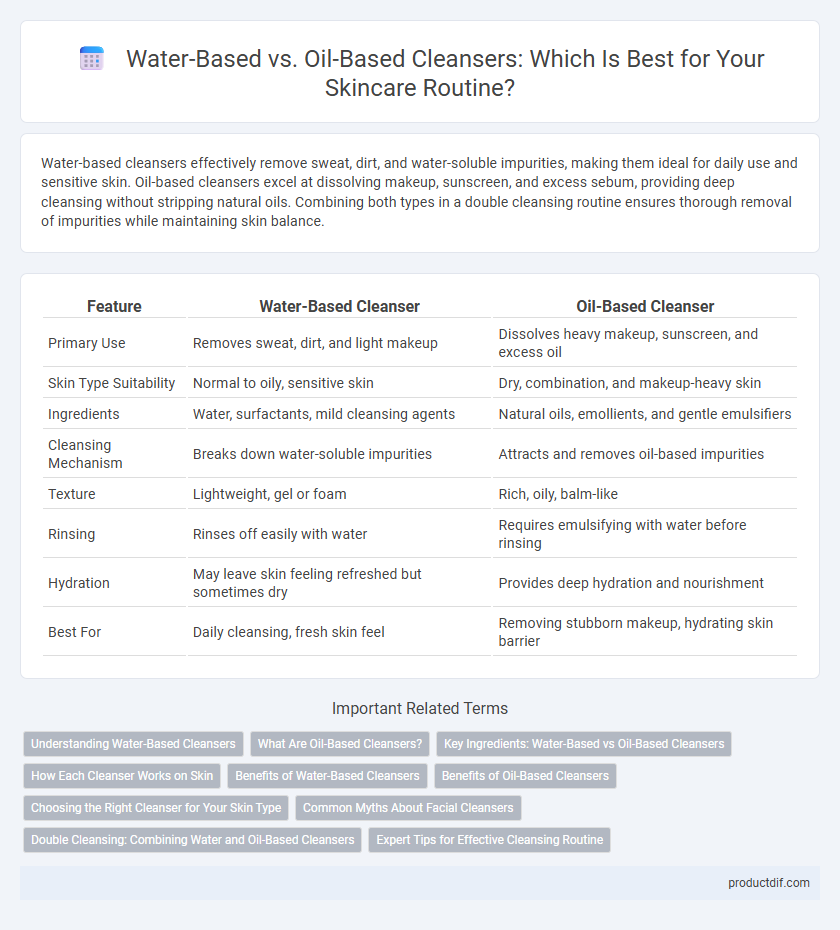Water-based cleansers effectively remove sweat, dirt, and water-soluble impurities, making them ideal for daily use and sensitive skin. Oil-based cleansers excel at dissolving makeup, sunscreen, and excess sebum, providing deep cleansing without stripping natural oils. Combining both types in a double cleansing routine ensures thorough removal of impurities while maintaining skin balance.
Table of Comparison
| Feature | Water-Based Cleanser | Oil-Based Cleanser |
|---|---|---|
| Primary Use | Removes sweat, dirt, and light makeup | Dissolves heavy makeup, sunscreen, and excess oil |
| Skin Type Suitability | Normal to oily, sensitive skin | Dry, combination, and makeup-heavy skin |
| Ingredients | Water, surfactants, mild cleansing agents | Natural oils, emollients, and gentle emulsifiers |
| Cleansing Mechanism | Breaks down water-soluble impurities | Attracts and removes oil-based impurities |
| Texture | Lightweight, gel or foam | Rich, oily, balm-like |
| Rinsing | Rinses off easily with water | Requires emulsifying with water before rinsing |
| Hydration | May leave skin feeling refreshed but sometimes dry | Provides deep hydration and nourishment |
| Best For | Daily cleansing, fresh skin feel | Removing stubborn makeup, hydrating skin barrier |
Understanding Water-Based Cleansers
Water-based cleansers effectively remove surface impurities like sweat and dirt without disrupting the skin's natural moisture balance, making them suitable for oily and combination skin types. These cleansers contain hydrating ingredients such as glycerin and hyaluronic acid, which help maintain skin softness and prevent dryness. Unlike oil-based cleansers, water-based formulas rinse off easily, leaving no residue and promoting a refreshed, non-greasy complexion.
What Are Oil-Based Cleansers?
Oil-based cleansers are skincare products formulated with oils that dissolve makeup, sunscreen, and excess sebum effectively without stripping the skin's natural moisture barrier. They are especially beneficial for removing waterproof makeup and are suitable for all skin types, including sensitive and dry skin. These cleansers work by emulsifying upon contact with water, allowing for a gentle yet thorough cleanse that maintains skin hydration and balance.
Key Ingredients: Water-Based vs Oil-Based Cleansers
Water-based cleansers primarily contain hydrating ingredients like glycerin and aloe vera, effectively removing sweat and dirt while maintaining skin moisture levels. Oil-based cleansers utilize oils such as jojoba, coconut, or mineral oil to dissolve makeup, sunscreen, and sebum, providing deep pore cleansing without stripping natural oils. Choosing the right cleanser depends on skin type and concerns; water-based options suit oily or acne-prone skin, while oil-based formulas benefit dry or sensitive skin needing gentle hydration.
How Each Cleanser Works on Skin
Water-based cleansers effectively remove sweat, dirt, and water-soluble impurities by penetrating pores and dissolving debris without stripping natural oils, making them ideal for oily and combination skin. Oil-based cleansers function by binding to sebum, makeup, and sunscreen, breaking down oil-based impurities and effectively dissolving heavy dirt while maintaining the skin's lipid barrier. Both types use different solubilization mechanisms to cleanse, with water-based formulas relying on surfactants and oil-based formulas using emulsifying oils to trap and remove contaminants.
Benefits of Water-Based Cleansers
Water-based cleansers effectively remove dirt, sweat, and makeup residue without stripping the skin's natural oils, making them ideal for sensitive and oily skin types. Their lightweight, non-greasy formulas provide deep hydration while maintaining the skin's moisture balance, reducing the risk of irritation and dryness. Rich in hydrating ingredients like glycerin and aloe vera, these cleansers promote a refreshed, smooth complexion and improve overall skin texture.
Benefits of Oil-Based Cleansers
Oil-based cleansers effectively dissolve and remove stubborn makeup, sunscreen, and excess sebum without stripping the skin's natural moisture barrier. Rich in nourishing oils, they help maintain hydration and promote a healthy, balanced complexion, especially beneficial for dry or sensitive skin types. These cleansers also support the skin's lipid barrier, enhancing overall skin texture and reducing irritation compared to water-based alternatives.
Choosing the Right Cleanser for Your Skin Type
Water-based cleansers effectively remove sweat and water-soluble impurities, making them ideal for oily or acne-prone skin due to their lightweight, non-greasy formulas. Oil-based cleansers dissolve makeup, sunscreen, and sebum, providing deep cleansing suitable for dry or sensitive skin that benefits from additional hydration. Selecting the right cleanser depends on your skin's oil production and sensitivity, ensuring optimal balance and maintaining the skin's natural moisture barrier.
Common Myths About Facial Cleansers
Water-based cleansers are often mistakenly believed to strip the skin of natural oils, but they effectively remove surface dirt and sweat without over-drying. Oil-based cleansers are wrongly thought to cause breakouts, although they dissolve makeup and sebum efficiently while maintaining skin barrier integrity. Both types of cleansers can be suitable for various skin types when chosen based on individual skin needs and formulation ingredients.
Double Cleansing: Combining Water and Oil-Based Cleansers
Double cleansing involves using an oil-based cleanser first to break down makeup, sunscreen, and excess sebum, followed by a water-based cleanser to remove sweat, dirt, and water-based impurities. This method enhances skin clarity by ensuring thorough cleansing without stripping natural oils, making it suitable for all skin types, especially oily and combination skin. Dermatologists recommend double cleansing to maintain a balanced skin barrier while effectively preventing clogged pores and breakouts.
Expert Tips for Effective Cleansing Routine
Water-based cleansers effectively remove sweat, dirt, and water-soluble impurities, making them essential for the first step in a double cleansing routine preferred by dermatologists. Oil-based cleansers dissolve sebum, makeup, and sunscreen, ensuring a thorough cleanse without stripping natural oils, especially beneficial for dry or sensitive skin types. Experts recommend using an oil-based cleanser followed by a water-based cleanser to maintain skin hydration while achieving a deep, residue-free clean.
Water-Based Cleanser vs Oil-Based Cleanser Infographic

 productdif.com
productdif.com